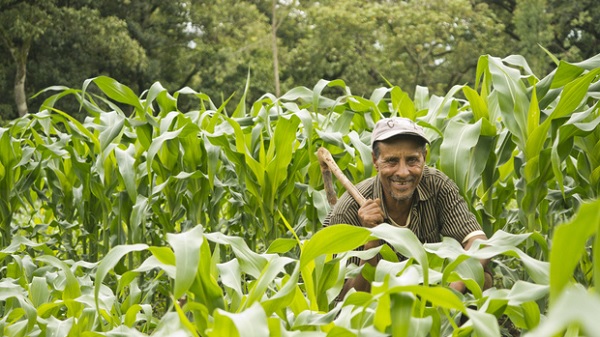
Agricultural extension services provide access to the knowledge and information that people need to increase productivity and sustainability. A World Bank-funded project is promoting agricultural growth by introducing video trainings in Ethiopia.
ADDIS ABABA (The World Bank)–Smallholder farmer Gebre Mengistu has been cultivating and growing low-yielding varieties of maize for years. Without access to proper extension support, Gebre said his yields were nominal; about 35-40 quintals of maize from his one-hectare plot in Kanchakurta Kebele, Dangila Woreda of Amhara National Regional State.
But this harvest season, Gebre could not believe his maize yield; he harvested 70 quintals from the same plot. Gebre attributes his bumper harvest to a change in the way extension advice is being provided, including information about improved agronomic practices. Agricultural extension services provide access to the knowledge and information that people need to increase productivity and sustainability, and Gebre said previous advice was focused more on theory than practice.
“It was more in an orthodox church-style sermon,” he recalled. “It was very difficult to comprehend since we could not visualize how to implement these improved agronomic practices in the field.”
This all changed last year for the better when Mebacha Demelash, the development agent responsible for the woreda, organized an extension training in his village. Armed with a Pico projector, she came to Gebre’s house, where 25 of his farmer friends had gathered. That small device turned his home into a little cinema theater, and for the next 40 minutes, they could see how to use proper spacing in a maize field, the appropriate timing of fertilizer application, and the correct application mechanism. This helped Gebre and his friends better understand and capture the agronomic advice, and properly implement the lessons in their maize plot, which resulted in significant yield increases.
Mebacha is among the cohort of development agents (DA) that have been trained as part of the digital green pilot under the World Bank-supported Agriculture Growth Project (AGP2). AGP2 promotes digital agricultural extension to deliver agronomic advice to farmers. Through the project, Subject Matter Specialists (SMSs) and extension staff, including DA’s, are trained to develop localized extension videos using local farmers and in local languages. Development agents are also equipped with small projectors to help disseminate the extension videos to farmers.
Mebacha said “seeing is believing” for most of the farmers, and the videos are a major driver of behavioral change. The videos also enable Mebacha to easily deliver extension messages to a large group of farmers, resulting in significant gains in productivity and ultimately in higher adoption rates.
This digital agriculture extension is being mainstreamed through the AGP2, and the Amhara region made a small allocation (ETB1.5 million/US$57,000) this fiscal year to buy Pico projectors for their agriculture extension agents in an effort to increase crop productivity and yield improvement.
“Digital extension delivery, as demonstrated by AGP2 a multi donor program has great potential,” said Vikas Choudhary, Team Task Leader. “It could greatly enhance efficiency of agriculture extension system, attain scale, facilitate adoption of new agronomic practices resulting in yield improvements and higher income for farming households throughout Ethiopia.”
Source: The World Bank
